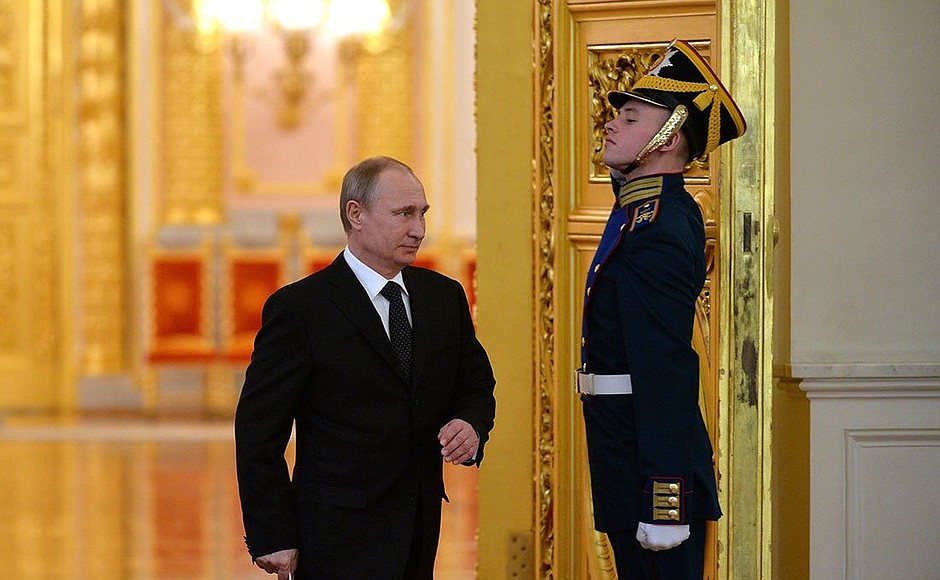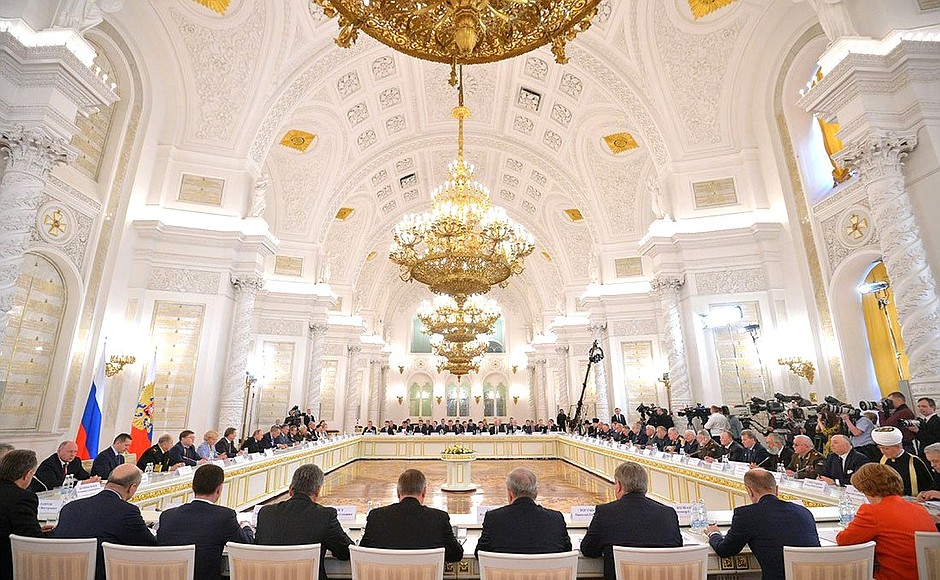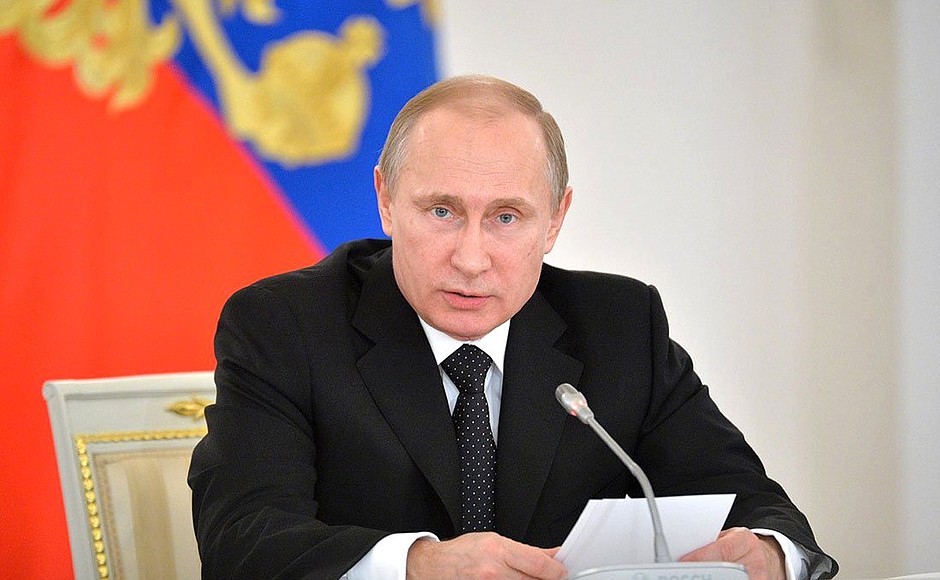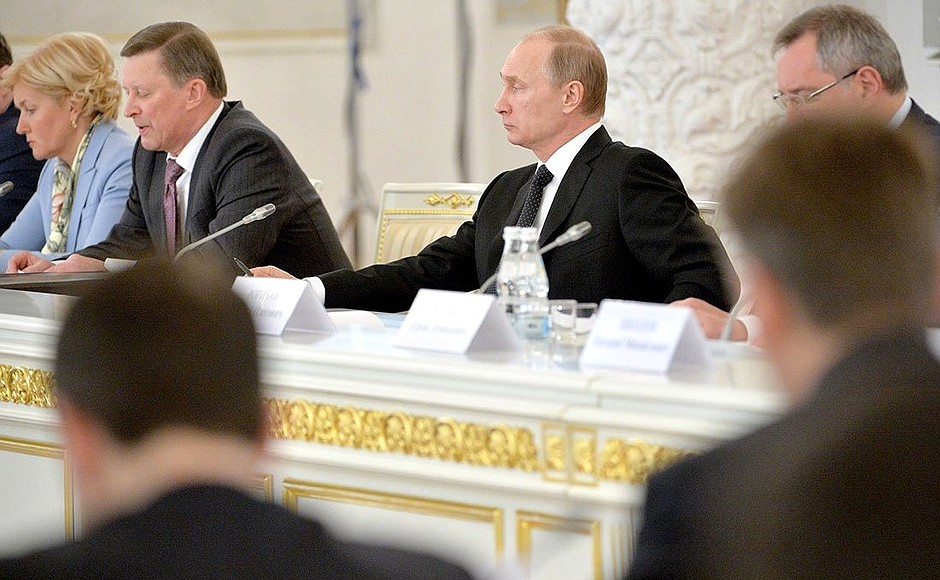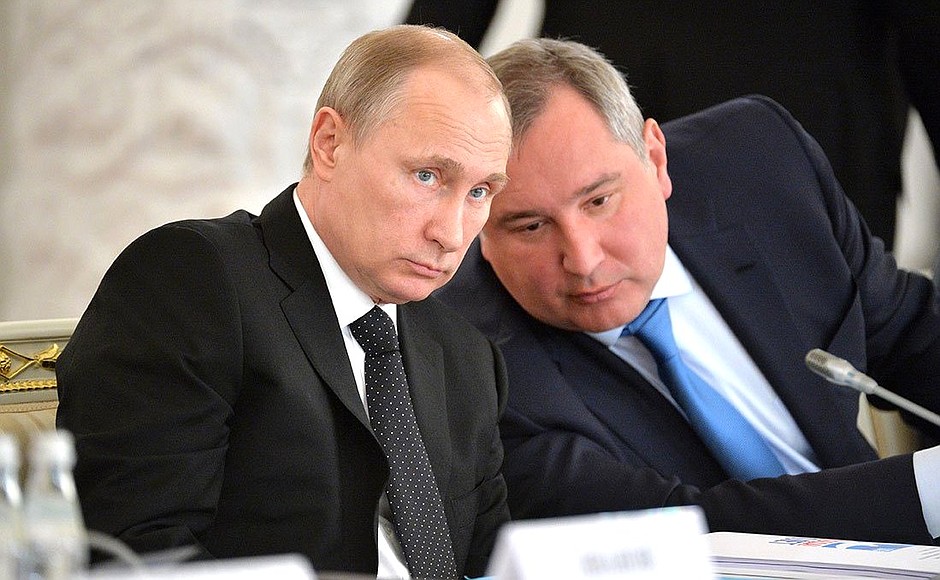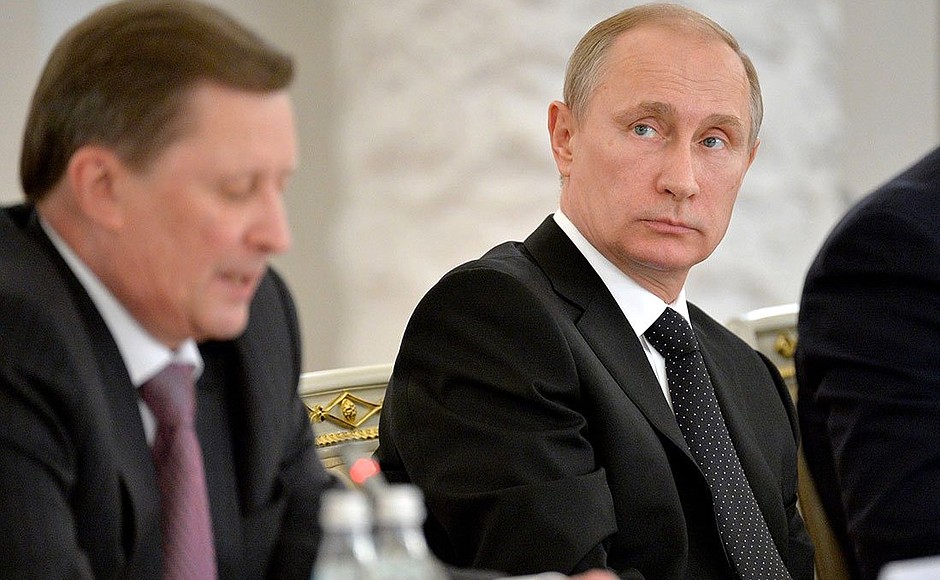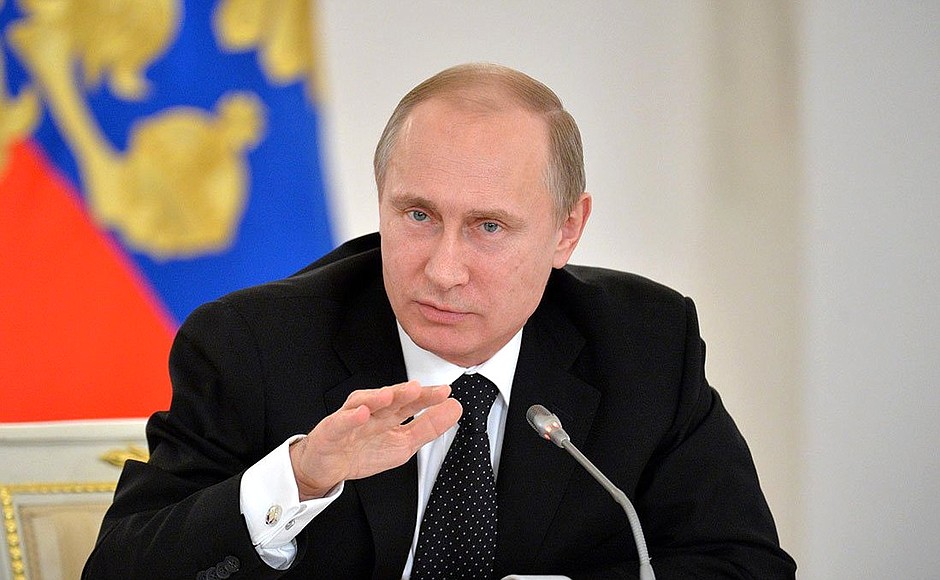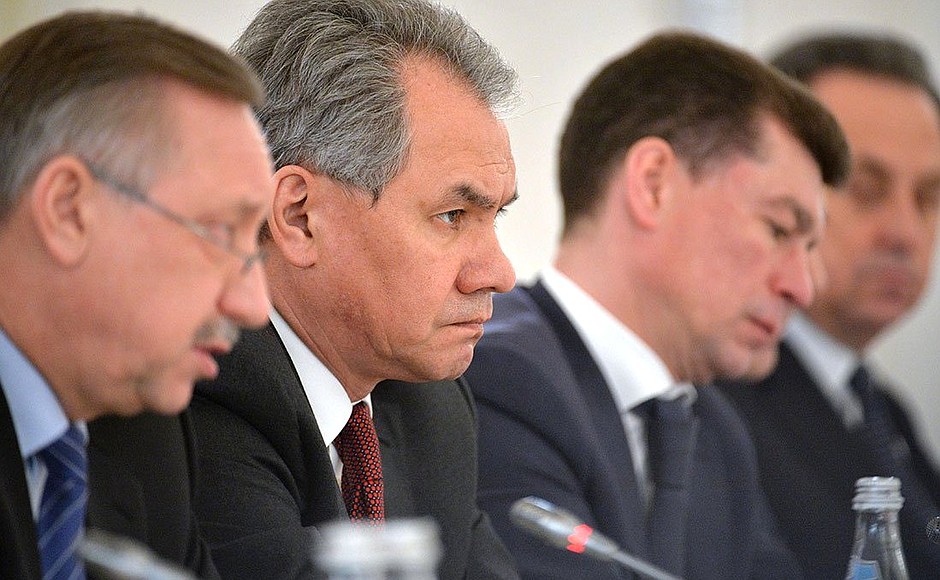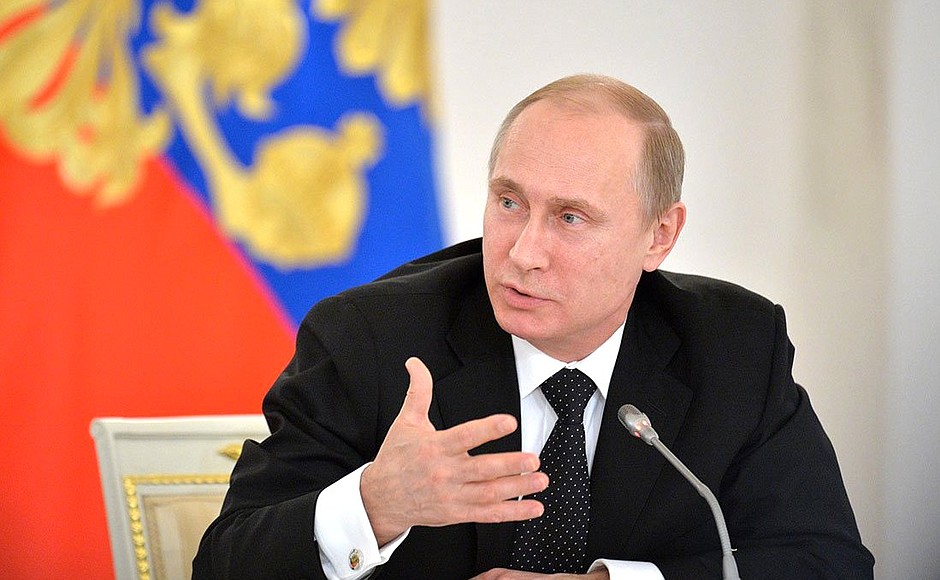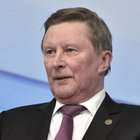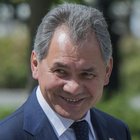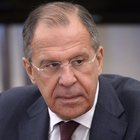The meeting participants discussed preparations for celebrations in Moscow and other regions of the 70th anniversary of Victory in the 1941–1945 Great Patriotic War, as well as efforts to improve the veterans’ social and economic situation.
* * *
Excerpts from transcript of meeting of the Russian Victory Organising Committee
President of Russia Vladimir Putin: Good afternoon, veterans, colleagues, friends.
We have 53 days left before May 9, which is not much considering how quickly time passes by and the scale of the tasks we have set ourselves in connection with preparing the celebrations of the 70th anniversary of the Great Victory. This is a round anniversary and requires special precision in our actions combined with an informal, creative and warm approach to organising all the events.
Today we will have a detailed discussion of the main issues the Victory Organising Committee is working on. I would like to stress that we must focus on the state of readiness for the planned events, including the nationwide ones to be held in Moscow. A special organising committee is responsible for all this, and it is headed by Mr Ivanov, Chief of Staff of the Presidential Executive Office.
Colleagues,
May 9 is a day of glory, a day of pride for our entire nation, a day of supreme veneration of the victorious generation. However, we all know that our veterans need constant, daily support. Therefore, the main issue for the Russia Victory Organising Committee is whether everything has been done to ensure all-round complete support for our veterans. As you may know, a Presidential Executive Order instructed the Government to take additional measures to improve the veterans’ social and economic situation, and this is something we will also speak about today.
There are over 2.5 million veterans in Russia. Each of them contributed to the Victory in decisive battles and on nameless heights, at military hospitals, in resistance units, during the siege of Leningrad, in Moscow, in all the regions, in the rear, in evacuation, where the vital power of this country was being strengthened by gruelling labour – all this was achieved through the efforts of specific individuals.
Unfortunately, today we see not only attempts at distorting the events of that war, but also unmasked cynical lies and impudent defamation of an entire generation of people who gave up everything for this Victory, who defended peace on earth. I am certain that all of you know this, there is no need to repeat it, but sometimes one finds it hard to even speak of the shameless conclusions and so-called observations that have nothing in common with the truth.
Their goal is obvious: to undermine Russia’s power and moral authority, to deprive it of its status of a victorious nation, with all the ensuing international legal consequences, to divide peoples and set them against each other and to use historical speculations in their geopolitical games. At times, it sounds like downright ravings – it is amazing how people get these ideas. In fact, they are not as harmless as they may seem because this is an attempt to implant very dangerous ideas and warped perception of history into the minds of millions of people, primarily the younger generation.
Therefore, preparations for the celebrations are not limited to organising gala events. This also involves efforts to educate and inform both nationally and internationally. We should constantly, firmly, persistently and with reason assert the truth about the war, about the colossal contribution of the Soviet people to the Victory, about the unifying and decisive role of the Soviet Union in the defeat of Nazism.
When I speak of a unifying role I mean that many nations within the then conquered Europe followed the developments on the fronts of the Great Patriotic War with hope. This, in turn, gave all of Europe strength and hope for a Nazism-free future.
Unfortunately, Russia, our whole society, is still being tested for its maturity and unity, for the strength of our historical traditions and the link between generations. Therefore, the task of the Russian Organising Committee and of the organising committees in every region of the Russia Federation is to meet these challenges with dignity, relying on the active support and involvement of the citizens.
It is also very important to make use of every opportunity to speak of our Fatherland’s history, of our ancestors’ glory in combat and in labour, to open the doors to all who wish to show their worth in this area and participate in the national cause of promoting patriotism and defending the national interests of this country.
Our veterans should be certain that we will never let them down; that we have always been able to pass on to our children our pride in them, in their Victory, which will forever stand great in history; that rejection of Nazism is in our blood.
In conclusion, I would like to thank the Russian media, both electronic and print, and those who operate on the Internet, for their special attitude to covering the anniversary. Both public and non-public media are treating this issue with a great deal of attention. Some not only speak of various initiatives in advance of the holiday, but also run stories about veterans, about search groups, young people’s participation in efforts to preserve historical memory, about the events of the Great Patriotic War and the key role of the Soviet Union in the Victory over Nazism. This work is very important and should be continued after the holiday, after May 9.
Let us begin our discussion.
Chief of Staff of the Presidential Executive Office, Head of the Organising Committee for the Main Events to Mark the 70th Anniversary of Victory in the 1941–1945 Great Patriotic War Sergei Ivanov: Mr President, colleagues, Preparations for the celebration of the 70th anniversary of Victory in the Great Patriotic War began well in advance, to be precise in April 2013, as soon as the corresponding Executive Order was made public. Back then, we could not even imagine that we would be working in such complicated conditions. A number of countries have launched a campaign to revise the outcome of World War II and the Great Patriotic War. True, we have met with such attempts before; however, lately the stream of cynical lies and falsifications has become unprecedented, as the President has just said.
For obvious reasons this did not leave our people indifferent and stirred in them a desire to make their contribution to upholding the historical truth and retaining the memory of the Soviet people’s courage. The Organising Committee was practically buried under an avalanche of proposals and projects coming from the citizens, veterans, public organisations, regions, municipalities, academic and artistic communities.
We are of course considering all of them with great care and taking them into account in our work. We know we should not only ensure that the events are held at the highest level possible, but also do all we can to defend the truth about the war, the victory and the role of the Soviet Union in the defeat of Nazism.
Of special value here are the recollections and records of those who took part in combat operations, who worked in the rear, of all who survived the horrors of the concentration camps, occupation and siege. Victory Day is first and foremost their day. In the period leading up to May 9, over 2.5 million veterans will be awarded the 70 Years of Victory medals.
We have also envisaged a one-off payment for them amounting to 7,000 and 3,000 rubles, depending on their category. Anniversary medals will also be presented to those Great Patriotic War veterans who currently reside in other countries, primarily the CIS.
Veterans will be the guests of honour at all the gala events; therefore during the holidays Great Patriotic War veterans, disabled veterans and those accompanying them will be able to use all public transport, except taxis, free of charge. As you may know, the Government received instructions to take measures to improve the veterans’ socioeconomic situation.
The Organising Committee is also receiving many requests from the regions to hold military parades and march-pasts. The Defence Ministry will make every effort to involve servicemen in the celebratory events.
I would like to highlight that 70 cities of the Russian Federation will host gala events involving the Army and Navy. The parades and marches will demonstrate various types of armaments and military equipment. Five cities will have Naval parades. Demonstration flights are also planned in five cities of Russia and in Minsk [Belarus] and Bishkek [Kyrgyzstan].
Undoubtedly, gala events in Crimea will be of special significance. We all remember the people’s enthusiasm in Crimea and Sevastopol on Victory Day last year, right after they returned to their home port. This year will see our first joint celebration of Victory Day in over 20 years. We need to do everything possible to ensure the atmosphere is not only solemn, but also warm and sincere, fraternal.
Military parades will be held in the hero cities of Kerch and Sevastopol, the latter is of course to see a naval parade as well. The focal point of the day will be the parade in Moscow’s Red Square.
I don’t want to disclose all the details now; I will only say that, just as we said at the Organising Committee meetings, the focus this year will be on the historical part of the parade. Troops will appear on Red Square on foot and in vehicles, dressed in the uniform of those times and bearing war-time weapons. Military equipment from those times will be on display in various locations in the capital (this is the first time we are doing this): it will be parked in places approved by the Moscow Government and people will be able to not only see them, but children will have a chance to climb all over them – it will be all very lively and informal. The parade will also demonstrate several samples of the latest military equipment. Here we remain true to tradition.
The foreign guests we have invited include war veterans, heads of state and government, defence ministers from the CIS and other friendly states and from the anti-Hitler coalition countries. More than a dozen countries will be sending their military units to take part in the parade, some of them for the first time. In turn, Russian servicemen, military equipment and armaments will take part in gala events in Minsk, Bishkek and Yerevan.
We are planning an informal meeting of the presidents of CIS states on May 8. The Defence and Foreign Ministers will provide more details on the foreign guests and participants and their itineraries.
There is just one more thing I would like to note here. The Organising Committee’s main approach to arranging events across the country is to support new creative approaches without imposing a universal mandatory programme. I believe this is already working. We can see the diversity of cultural itineraries for the anniversary in various regions.
<…>
Another aspect of the coming anniversary that the Organising Committee has supported is the broad-scale involvement of young people in organising and conducting the events. Rosmolodyozh [Federal Agency for Youth Affairs] is forming a national volunteer corps for the 70th Anniversary of the Victory, which will bring together up to 80,000 young people. They will take part in military memorial efforts and in upgrading military burial grounds and memorials.
<…>
A large number of projects are being implemented on the Internet. Of course, we are paying close attention to information support. On May 9, we are planning to hold unprecedented television coverage of all the military and naval parades.
We are also setting up a large international press centre for the events – we are almost done here. The centre has the most advanced equipment, similar to what we had in Sochi. The official website has already been launched where journalists are being accredited.
<…>
Defence Minister Sergei Shoigu: Mr President, colleagues,
In line with tradition the military parades will become one of the highlights of the celebrations of the 70th anniversary of Victory. They are to be held in 28 Russian cities, and in the capitals of Belarus and Kyrgyzstan, and in Armenia. Marches with the participation of military equipment and armaments are to be held in 40 cities.
Naval parades are to take place at the five main bases of the Russian Navy. Aviation is to take part in the parades in five cities in Russia and two cities in the CIS – Minsk and Bishkek. On March 25, the parade teams will begin their training.
As of today, 78,653 people will be taking part in the events. A total of 1,880 units of military equipment and armaments, 238 aircraft and 51 naval vessels will be involved. Taking part in the parades in Belarus, Kyrgyzstan and Armenia will be more than 1,000 servicemen, 74 units of modern armaments and military equipment and 16 aircraft and helicopters of the Russian Federation Armed Forces. The main parade will obviously be held in Red Square. Compared to the 2010 anniversary parade, there will be 50 percent more servicemen marching on foot, which is more than 15,000. The historical part of the parade will undoubtedly be of great interest. I will not go into this – Mr Ivanov has already mentioned it briefly.
As for the mechanised section, it is to include 194 units of armaments and military equipment, some of which were created on instructions from the Defence Ministry and will be demonstrated for the first time on May 9. I would like to note that 16 military units from friendly states and anti-Hitler coalition members have been invited to take part in the military parade. Nine of them have confirmed their participation, two have turned down the invitation, and five are still pending.
The Defence Ministry intends to invite 26 heads of foreign military departments whose units will take part in the parade in Red Square and our partners in defence and military technology cooperation.
Official invitations have also been issued to 85 participants in the Great Patriotic War in all regions of Russia and to 75 veterans in 23 countries.
I would like to add that veterans will take part in all key events on May 9: the military parade, the gala reception with the President of Russia and the gala concert in Red Square. In addition, we have envisaged a varied cultural programme for the duration of their stay in Moscow.
Preparations for the military parade and marches and the visits by participants and guests are on schedule. The Defence Ministry will perform all the tasks set before it with success.
<…>
Foreign Minister Sergei Lavrov: Mr President, colleagues,
The Foreign Ministry is giving priority attention to participation in all events related to preparations for the Great Victory anniversary. Invitations to the celebratory events have been sent to the heads of 68 foreign states, as well as the heads of the UN, UNESCO, Council of Europe and the European Union. As of yesterday, the leaders of 26 nations have confirmed their participation, as have the heads of UNESCO and the Council of Europe.
For reference, only 28 foreign participants attended the 65th Victory anniversary in 2010. Those who confirmed their participation in this year’s events include Chairman of the People’s Republic of China Xi Jinping, presidents of India, South Africa, Vietnam and Mongolia, and leadership from Cuba and North Korea.
Naturally, as far as the European nations are concerned, the current actions by the Americans and the aggressive core of the European Union are having an effect, as Mr President already explained in detail. But in Europe, there are many who understand the significance of the upcoming celebrations in Moscow – not just to pay tribute to the memory of those who defended Europe and the world against Nazism, but also to improve the situation on our continent today, to prevent a new schism in Europe.
It is expected thatthe President of the Czech Republic, the heads of Slovakia, the Prime Minister of Greece, the President of Cyprus will participate; the heads of Bosnia and Herzegovina, including the President of the Serb Republic of Bosnia and Herzegovina, and the heads of Iceland, Macedonia, Montenegro, Serbia, and Norway have confirmed their participation in various ways. Again, these confirmations came in various forms, including some who confirmed their participation orally; all of this is subject to clarification.
Chancellor of Germany Angela Merkel’s agreement to visit Moscow has particular significance in disruptingthe anti-Russia campaign. The specific parameters of her participation in this event are currently under discussion. Naturally, the heads of all foreign diplomatic missions in Moscow will be invited.
Foreign delegations will attend the parade, and it is planned that military units from a whole range of nations will take part, as Mr Shoigu just noted. In addition to CIS nations, India, Mongolia and China have confirmed their participation, and we will most likely soon have a final confirmation from Serbia.
After the parade, foreign guests will participate in a collective ceremony of laying flowers at the Tomb of the Unknown Soldier in Alexander Garden, followed by a gala reception at the Grand Kremlin Palace. A special programme is planned for veterans from 23 countries in near and far abroad, as Mr Shoigu just explained.
We are giving particular attention to strengthening coordination and actions with partners in the Commonwealth of Independent States. We are preparing an informal meeting between CIS leaders who will be participating in the events, and a special meeting is proposed on the eve of the events, on May 8, in the format of the heads of state who arrive in Moscow.
Given that this year has been declared the Year of Great Patriotic War Veterans in the CIS, suggestions are being prepared on having the heads of state who participate in these events make a special address to war veterans and home front workers. This would have great unifyingsignificance for the veterans and for our cooperation with our close neighbours, including in our efforts to fight the falsification of history. In addition, together with our key allies in the CSTO and the CIS, we are planning large-scale events within the framework of the UN General Assembly, the OSCE and the Council of Europe, which are timed to coincide with the 70th anniversary of Victory.
<…>
Vladimir Putin: I would like to say the following in conclusion. It is clear that this is an important, major, grand event and will require a great deal of effort on your part. We have been working on this for a long time, as Mr Ivanov already stated. There are some perennial things we will be doing so long as the last veteran is among us. I am referring, first and foremost, to socioeconomic matters.
Of course, one of the most important aspects is providing them with housing. We have been working on this actively since 2008. Everything we have done has surpassed all of our expectations: we increased the volume of housing provided manifold. As you know, we initially thought we would need 28,000 or so units, but now we have more than 100,000 – we have provided nearly 200,000 apartments and have not yet completed our work. But we will need to complete it, and we will do so.
<…>
Now, with regard to the work of the Pobeda (Victory) Organising committee itself. It was created not just as a body to deal with preparations for the celebratory events related to anniversaries and May 9 in general. This structure was created as an effective tool for carrying out patriotic work in the nation overall.
I want to point this out, and I know that Mr Ivanov and other colleagues working on this project will use this structure to resolve this greater but, of course, no less important, and perhaps even more important work, than the official celebrations themselves.
We understand that May 9, Victory Day, is a day that unites the entire nation. And we certainly need to use this fact to not only resolve issues of promoting the appropriate caring attitude toward veterans, but also to ensure that the cause they served was not in vain, so that young people in our nation appreciate all the best things our veterans gave us, things from our past, from our history.
Allow me to once again express gratitude and respect to the veterans of the Great Patriotic War, to thank all the participants in preparations for May 9 and express hope that we will carry everything out and hold the celebration of the 70th anniversary of Victory of the Soviet People in the Great Patriotic War at the highest, most commendable level.
Thank you very much.
